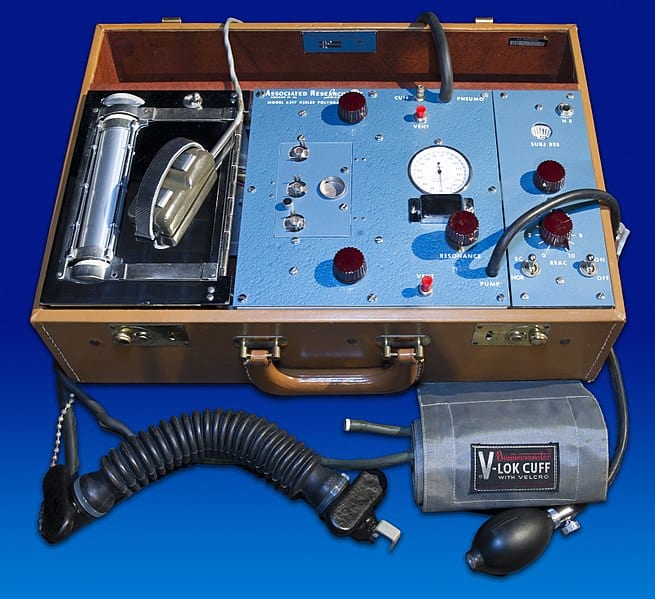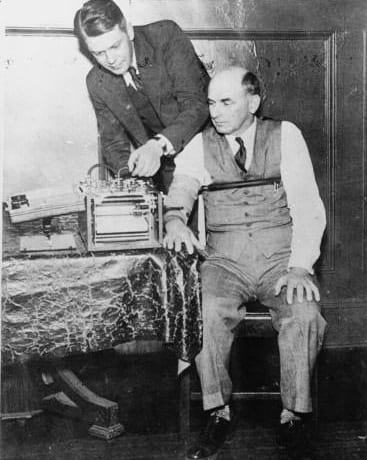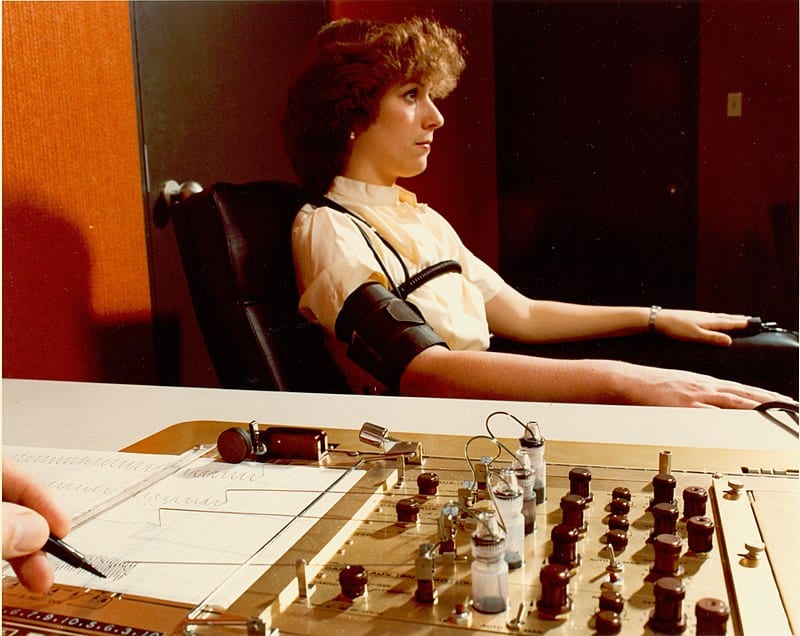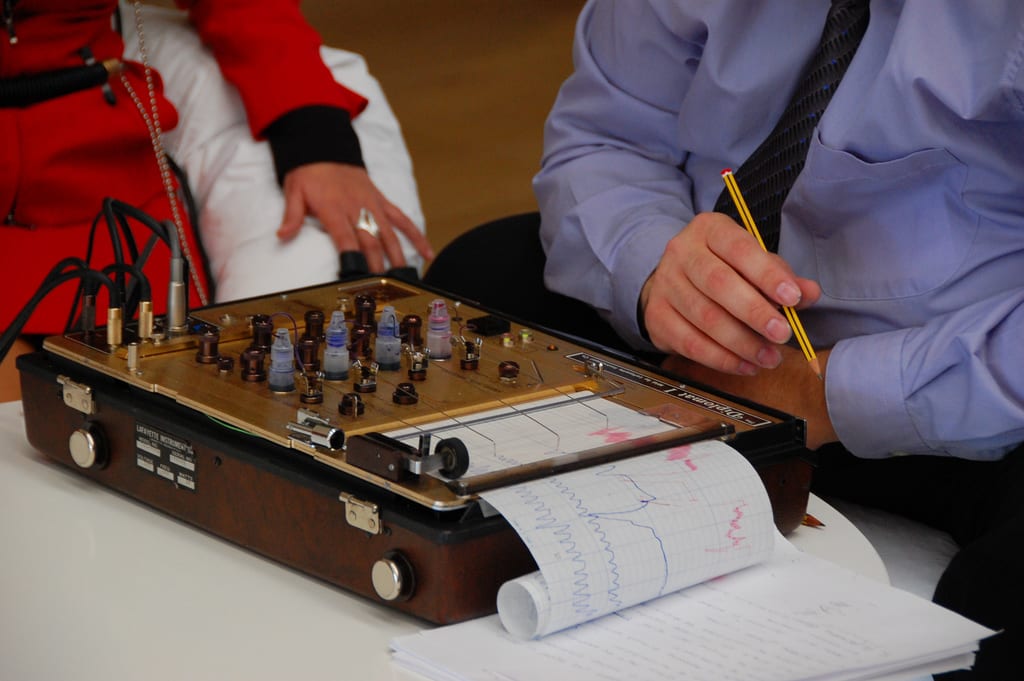Trending Now
If you’ve watched any television for the past, oh, say 40 years or so, you’ve learned one thing: the polygraph, also known as the lie detector test, is a useful tool to put away vicious criminals and to determine if some of America’s most upstanding men are the fathers of various children.
It’s been drilled into our brains as a society that lie detectors are a force for good in a world full of evil. But the truth is, sadly, that these devices that have been around for nearly 100 years don’t work. The results are based on an outdated pseudoscience and people can beat the polygraph if they know what to do.

Photo Credit: Wikimedia Commons
The modern polygraph machine was invented in 1921 by John Augustus Larson, a police officer in Berkeley, California who also had a Ph.D. in physiology. Larson’s machine continuously recorded a person’s blood pressure and breathing. The Berkeley Police Department began using Larson’s device to interrogate suspects in various crimes. Larson’s protege, Leonarde Keeler, update the polygraph machine to include measuring electrodermal activity (observing sweat glands to measure emotional responses) and made the device portable. Thus began the life of the polygraph as a tool for fighting crime and convincing juries of people’s guilt from coast to coast.

Photo Credit: Public Domain
The American Polygraph Association says that the tests have an 87% accuracy rate. And that number means that many police departments, the FBI, CIA, and attorneys rely on polygraph test results to put people behind bars.
Polygraphs were also used in the workplace. By the early 1980s, more than one million Americans were taking lie detector tests to either get a job or keep their jobs. Kind of hard to imagine that happening today. In 1988, the federal government passed a law prohibiting most private employers from using lie detector tests in the hiring process or to allow people to keep their jobs.

Photo Credit: Public Domain
One major problem with polygraphs: they are based on the assumption that lying causes stress. Studies show that when people lie, they feel shame, remorse, and they get nervous. We may start to sweat, our blood pressure may rise, and our heartbeats might rapidly increase. The lie detector obviously measures all of these psychological responses, and that is why they have been relied on in law enforcement for nearly 100 years.
But those responses don’t always occur in everyone who is tested by a polygraph. People who lie habitually become used to it and their brains are less likely to trigger the involuntary physiological responses that most of us would experience while deceiving someone. In other words, liars can beat a polygraph test. In fact, some famous cases of guilty people beating lie detectors include Gary Ridgway, also known as the Green River Killer, and Soviet spy Aldrich Ames.

Photo Credit: Public Domain
Neuroscience researcher Neil Garrett says, “It is likely the brain’s blunted response to repeated acts of dishonesty reflects a reduced emotional response to these acts.”
People may also experience reactions that look like they are trying to deceive investigators, but they are just natural responses. A person might sweat, breathe more rapidly, experience a higher heart rate, or see a rise in blood pressure because they are scared, upset, or embarrassed at a line of questioning. Something as trivial as the cardio cuff placed on the arm too tightly might affect the way a person’s body reacts during a polygraph test.
Doug Williams, a former Oklahoma City police officer who gave many polygraph tests during his career and is now a vocal critic of the practice says, “The polygraph is not a lie detector, and it is not a truth verifier, it is simply a crude reaction recorder, and the reactions it records can be indicative of just about anything except deception.” Williams even says that you can beat the test by using breathing and muscle exercises.
But law enforcement personnel continue to use polygraph tests as part of their investigation process, despite the huge amount of evidence of how flawed the process can be. Why? One reason is to try to trick suspects into confessing (sometimes falsely, unfortunately). The mere presence of the polygraph machine is enough to get some people trembling, and cops use it to their advantage to manipulate suspects. The police know that what the polygraph test really measures is anxiety.

Photo Credit: Wikimedia Commons
The laws vary regarding polygraphs across jurisdictions: some judges allow polygraphs during trial, and some do not. Polygraphs are completely inadmissible in courtrooms in certain states, including New York, Texas, Illinois, and Pennsylvania (and Washington, D.C.). In California, Arizona, Nevada, Georgia, and Florida, lie detector test results are admissible in court if both parties agree to allow it. Military courts have banned polygraphs completely.
In 2002, the US Department of Energy requested that the National Research Council of the National Academies of Sciences, Engineering and Medicine conduct a study about the validity of polygraph tests. The Department of Energy was considering using lie detector tests to determine if any of their personnel might be a threat to national security. After the research was completed, the council stated, “Almost a century of research in scientific psychology and physiology provides little basis for the expectation that a polygraph test could have extremely high accuracy.” The council added that the results of lie detectors “is scanty and scientifically weak.”
So what did we learn today? If you’re ever hauled into the police station and the police attempt to hook you up to a polygraph machine, REFUSE IT. Whether you’re innocent, or you’re guilty and you think you can beat the test, the results may be skewed and you don’t want to mess around. Your freedom, and your life, may depend on it.






